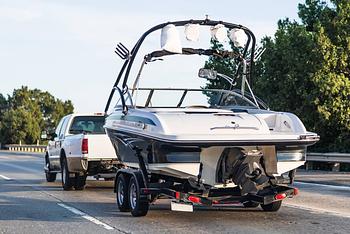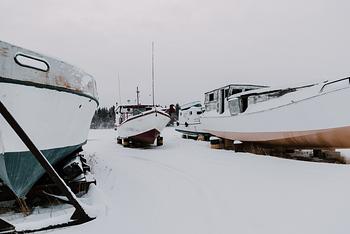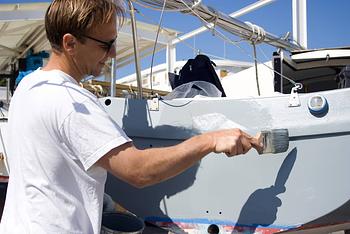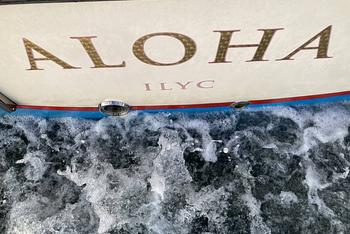While a fire on a boat that is well maintained is highly unlikely, fires at sea can be devastating and so it’s vital that, as boat owners, we are prepared for the worst. Fires on boats can escalate quickly and become very serious, as we’ve seen in 2022 with several fires on superyachts including 43 metre Aria SF and 27 metre Pesa.
Different sized vessels will require different boat fire safety rules and equipment, and what a superyacht will need in place is vastly different to your small sailboat or galley-free fishing boat, but here we take a look at the measures you need to have in place to ensure you, your passengers and your boat remain safe from fires at sea.
Not All Fires are the Same
Before we look at how to prevent or tackle a fire, we need to understand where fires originate and the differences between them. While all fires need oxygen, fuel and heat, they can start from several different sources including;
-
Solids such as wood, paper or fabrics (Type A)
-
Liquids such as oil, diesel and petrol (Type B)
-
Gases such as butane or propane (Type C)
-
Metals (Type D)
-
Cooking substances such as oil, fat or bread (Type F)
-
Electrical appliances
Knowing how fires start, it’s important to understand what are the biggest fire hazards on a boat? In general, many boat fires are caused by;
-
Smoking below deck: This should be forbidden on all boats
-
Ovens and cookers in the galley: Keep the galley clean and free of grease, oil and crumbs. Install and regularly check a smoke detector and never leave food cooking unattended
-
A build-up of butane or propane gas in the bilges: To ensure this build-up doesn’t occur and that gas is cleared make sure to open hatches and cruise downwind to allow fresh air into the cabin areas. You also need to regularly pump the bilges. Check butane and propane gas fittings and tubing regularly to ensure there are no leaks
-
Faulty wiring: Ensure you stick to a regular maintenance schedule and have all wiring checked regularly
-
Petrol vapour in the engine bay: Vent engine bays each time before you start the inboard engines
-
Flammable paint and solvents: Make sure all flammable liquids are stowed in well secured, upright containers in lockers that vent outboard
-
BBQ’s: Having any sort of open flame on or near your boat is a recipe for disaster so BBQ’s of any kind shouldn’t be used. Likewise, if you have a BBQ on shore make sure it’s far enough away from your boat that any embers can’t be carried by a gust of wind.
-
Solid fuel stoves: These are almost wholly found on inland waterways boats such as canalboats, barges and house boats as they are a popular way to heat them during the colder months. But special care must be taken as many accidents have occurred. Be sure not to over fire the stove, to keep anything flammable far from it, to maintain and clean it regularly and to be aware of carbon monoxide poisoning from the stove flue gases.
With this mixture of maintenance-related hazards and human error we can see that boat fire safety needs to be approached from many different angles and there is no one-size-fits-all approach. The size of the crew, the passengers on board, the main function of the boat, the age of the boat and many other factors need to be considered to create a personalised boat safety scheme checklist for your boat.
Fire Prevention on Boats
Your best line of defence against a fire on a boat is to prevent it happening in the first place. Once a fire has started it can quickly get out of control, so while it’s imperative to have all the correct extinguishers and fire on board ship procedures in place, preventing the fire is key. We have looked at the main causes of fires and how to best avoid them above, but special care should be taken with regards;
-
Flammable Liquids and Gas: Ideally no flammable liquids or gases should be stored on a boat where they are not absolutely necessary. Minimise the amount you carry and consider whether it’s vital to the functioning of your boat or if they can be stored at the marina or boatyard. Spare diesel for the main engine, petrol for an outboard motor and chemicals for maintenance are all often carried on board however so proper storage is vital. They need to be securely stowed in an upright position so they can’t slop around, kept in dedicated lockers with vents and drains to outboard.
-
Engine Room: Engine room fires can these days be treated without having to open the main hatch and enter the room, as this only fuels the fire. Larger yachts and boats will have specialist fire systems available, but for smaller boats the option of a small hole through which a fire extinguisher can be placed is a good solution.
-
Galley: Galleys are often one of the main sources of a fire so careful management is vital to fire safety. You should never leave the galley unattended while cooking, for example while something is simmering on the stove. If you have to leave the galley, turn the hob off until you come back. Likewise, don’t cook when you’re tired or under the influence of alcohol. Oil and grease are extremely flammable so keep the galley clean and take extra precautions when cooking with oil, and instead of matches or lighters, use a spark device which doesn’t have a naked flame. Ensure good ventilation to prevent a build-up of carbon monoxide, and ensure that all hob burners have a device which shuts off the gas if the flame goes out to prevent highly flammable gas seeping into the galley.
Fire Extinguishers
Boat fire extinguisher requirements vary from country to country so it’s important to follow class or local regulations. Different extinguishers are used to treat different types of fires (categorised by Types A-F). When looking to purchase an extinguisher you will see a number and letter combination – this denotes the fire group and size of fire it can tackle. Some extinguishers can tackle more than one group and this will be shown with two or more letters. Different types of extinguishers include:
-
Water: Suitable for Type A fires only and not to be used on liquid, gas or electrical fires
-
Dry Powder: Can be used on a combination of fire types including D only, B and C, or A, B and C
-
Foam: Suitable for type A and sometimes B fires, and not to be used on electrical fires
-
Carbon Dioxide: To be used on Type B fires only
Smoke and Carbon Monoxide Alarms for Boats
Fires on boats can escalate quickly and be devastating, but the first danger is from smoke. Toxic fumes can render boaters unconscious in moments and so early detection is vital in fighting the fire and ensuring everyone on board stays safe. The best way to do this is with properly installed smoke detectors. You will need smoke, gas and carbon monoxide detectors on board which are resistant to the damp, humid conditions on boats.
-
Make sure you only buy and install detectors which meet national regulations and are certified for use on boats. Optical sensor boat smoke alarms which have sealed, non-replaceable batteries are the preferred type for boats.
-
It is also worth considering installing linked boat fire alarm system which will all go off at the same time. This ensures that when you will always hear the alarm, even if you are at the other end of the vessel or in a deep sleep.
-
Never disconnect the detector or remove the batteries
-
Be sure to test alarms each time you board, or at least every month
Fires on boats are extremely rare and boating is a safe and fun family activity. Rightboat.com is the world’s largest online marketplace for the buying a selling of new and used boats. Whether you’re dreaming of your very first boat, or looking to upgrade, we have one of the largest stocks and connections with the best brokers in the business. Get searching and see the amazing boats on offer.
Related Articles and Guides
29th Mar 2024
How to Transport Your Boat Four Different Ways
18th Oct 2023
How to Winterize a Boat: Steps, Checklist and Costs
20th Sep 2023
Painting a Fiberglass Boat: A Detailed Guide
19th Sep 2023






